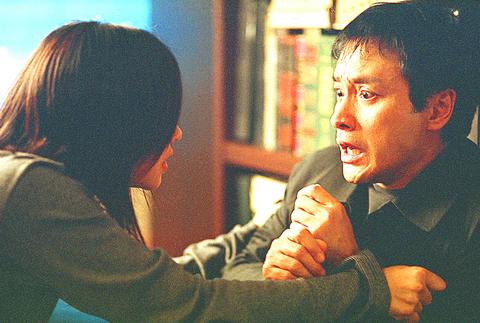Ghost films have become a trend in Hong Kong filmmaking and something a money making machine at the box office. But making all this "ghost money" might, for the superstitious Hong Kong film industry, have inauspicious effects.
In Inner Senses (

PHOTO COURTESY OF GROUP POWER
According to Hong Kong media, making this ghost film might have damaged Cheung's acting career, which is currently in transition as he angles to become a film director.
In the film, Cheung plays a psychiatrist who is treating Lam, a young woman suffering from constant hallucinations and panic attacks. Cheung convinces himself that the symptoms are caused by Lam's traumatized family life and her love affairs, and that by falling in love with her, he will be able to rescue her from falling into a psychological black hole.
Then the inconceivable happens. The psychiatrist starts to see the ghost of his high school girlfriend who committed suicide 20 years ago when he broke up with her.
In real life as in the film, Cheung (who established a reputation for his roles in Farewell My Concubine and Days of Being Wild), has been reported suffering from depression. Although his role in Inner Senses earned him a nomination for a Golden Horse award last November, this does not seem to have lifted his mood.
During the shooting of Inner Senses, the 46 year-old actor was reported as being "too involved" in his role for this film and was suffering from insomnia as a result. And now, Cheung has turned down all promotional appearances for health reasons even as the film is getting ready for commercial release in Hong Kong, Japan, Korea and Taiwan. During his few public appearances Cheung has looked pale and weak.
Speculation has been mounting in the Hong Kong media. It's been reported that the actor has been worried that his screen image is not youthful and beautiful anymore, and signs of baldness have been commented on in recent years.
Cheung began his career as an actor and pop singer in 1978, and has always been portrayed as a handsome, clean-cut leading man. His current depression has been attributed to a crisis in his 17-year relationship with his boyfriend, the mysterious Mr. Tang. The official reason is that Cheung is taking a course of Chinese medicines and it is inconvenient for him to travel.
Whatever the reason may be, many on-going projects have been affected. Cheung recently canceled such filmmaking projects as Beautiful Shanghai (
His own production company, Dream Team (夢幻聯隊), was preparing to shoot Stealing Heart (偷心), to be directed by himself and starring two Chinese actors, Hu Jun (胡軍) and Ning Jing (寧靜), but even this personal project has been temporarily abandoned.
Has the making of Inner Sense put a hex on Cheung? This is what the gossip rags are asking, and ghosts and lost love are definitely more exciting than a career that has been involved in an extended downswing.

Growing up in a rural, religious community in western Canada, Kyle McCarthy loved hockey, but once he came out at 19, he quit, convinced being openly gay and an active player was untenable. So the 32-year-old says he is “very surprised” by the runaway success of Heated Rivalry, a Canadian-made series about the romance between two closeted gay players in a sport that has historically made gay men feel unwelcome. Ben Baby, the 43-year-old commissioner of the Toronto Gay Hockey Association (TGHA), calls the success of the show — which has catapulted its young lead actors to stardom -- “shocking,” and says

Inside an ordinary-looking townhouse on a narrow road in central Kaohsiung, Tsai A-li (蔡阿李) raised her three children alone for 15 years. As far as the children knew, their father was away working in the US. They were kept in the dark for as long as possible by their mother, for the truth was perhaps too sad and unjust for their young minds to bear. The family home of White Terror victim Ko Chi-hua (柯旗化) is now open to the public. Admission is free and it is just a short walk from the Kaohsiung train station. Walk two blocks south along Jhongshan

The 2018 nine-in-one local elections were a wild ride that no one saw coming. Entering that year, the Chinese Nationalist Party (KMT) was demoralized and in disarray — and fearing an existential crisis. By the end of the year, the party was riding high and swept most of the country in a landslide, including toppling the Democratic Progressive Party (DPP) in their Kaohsiung stronghold. Could something like that happen again on the DPP side in this year’s nine-in-one elections? The short answer is not exactly; the conditions were very specific. However, it does illustrate how swiftly every assumption early in an

Snoop Dogg arrived at Intuit Dome hours before tipoff, long before most fans filled the arena and even before some players. Dressed in a gray suit and black turtleneck, a diamond-encrusted Peacock pendant resting on his chest and purple Chuck Taylor sneakers with gold laces nodding to his lifelong Los Angeles Lakers allegiance, Snoop didn’t rush. He didn’t posture. He waited for his moment to shine as an NBA analyst alongside Reggie Miller and Terry Gannon for Peacock’s recent Golden State Warriors at Los Angeles Clippers broadcast during the second half. With an AP reporter trailing him through the arena for an